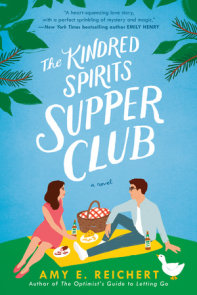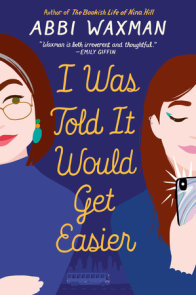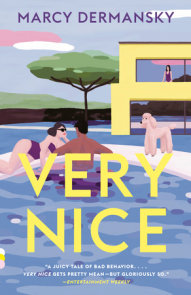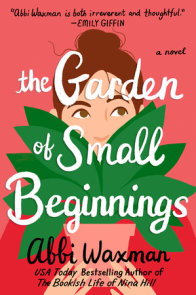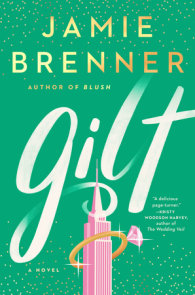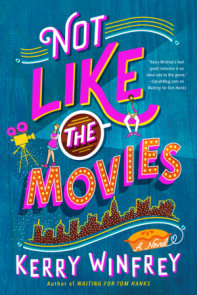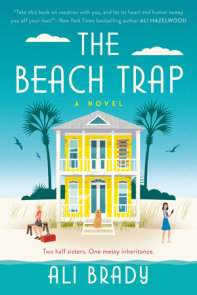READERS GUIDE
Questions and Topics for Discussion
INTRODUCTION
Three years ago, on the Friday before Independence Day Emmy left her engagement ring, and her fiancé Matt in a seaside hotel room. In this bold and terrifying moment, she walked away from the first love of her life and straight into uncertainty. Surprising even herself, she put her film school dreams on hold, took a job at a Narragansett tackle shop, and began compiling a documentary about fishermen’s wives awaiting their husbands’ return. But another July 4th has rolled around and she is reluctantly heading home to New York for her brother Josh’s wedding.
She’s been dreading this return home and the inevitable questions about her life that she knows will come from pestering aunts and family friends, and even from Josh. Josh—her childhood hero and a successful doctor now—seems to have it all figured out and always has. He never did the silly things Emmy did when they were kids (like voting for London year after year as their family’s summer car trip destination). In two days her “perfect” older brother is to marry the seemingly perfect woman, Meryl, taking the giant life step that Emmy was unable to complete. So when Josh confesses to Emmy that he’s not sure he’s doing the right thing—and that he’s actually been seeing another woman—Emmy is shocked.
After a night of revelry at Josh’s bachelor party, Emmy convinces Josh that he needs to face his indecision head on, so they drive to Rhode Island to visit Elizabeth, the “other woman,” for one last time before the wedding. Emmy is surprised to see how Josh changes in the company of Elizabeth and her young daughter. Having been taken care of his whole life, he seems here, on Elizabeth’s farm, to relish the role of caretaker. When they return to New York that afternoon, Josh seems no closer to a decision, Emmy is more confused than ever, and the wedding is less than twenty-four hours away.
Emmy’s confusion only intensifies when, that evening, she runs into Matt. She can’t deny how good it feels to see him again, to kiss him. In a heady moment of reunion, they agree to meet the next night after the wedding, at their favorite diner.
The wedding day is another sweltering one in a New York summer heat wave. Everyone is busily getting ready at the elegant Essex house in Manhattan, with air conditioners running at full blast, when, suddenly, there is a blackout in the city. Ironically, it seems that in the darkness and disarray, Josh is finally able to confront the situation in front of him and its consequences.
As the turmoil surrounding Meryl and Josh begins to subside, Emmy is forced to confront her own indecision: What has she been doing with her life these last three years?
By the time she heads to the diner to meet Matt, she knows that she needs to make realistic choices based on the future, not the past, and that sometimes our missteps and the detours in life can end up taking us exactly where we need to be.
ABOUT LAURA DAVE
Laura Dave was born in New York City in 1977. Her writing has appeared in Glamour, Self, and ESPN the Magazine. A graduate of the University of Pennsylvania, she is the recipient of a Henry Hoyns Fellowship, a Tennessee Williams Scholarship, and an AWP Intro Award in Short Fiction. This is her first novel.
A CONVERSATION WITH LAURA DAVE
You have a very wise and mature view of life and love. Since you are still in your twenties, some might say you are wise beyond your years. How would you respond, and where do you think this wisdom comes from?
I would respond by saying thank you! I have always been really interested in understanding love and relationships—especially unconventional relationships, like Josh’s and Elizabeth’s, which often have an elegance to them. Any insight I have acquired comes from this interest and from my inner-nosy-body—who asks both friends and strangers too many questions about their marriages and relationships. One of my favorite questions to ask couples who have been together for a long time is how they met each other. I love watching the expressions on their faces as they remember. Often, their expressions soften—and it isn’t unlike watching them fall in love as they talk about the beginning of being together. That may sound sentimental, but it’s true. And it’s an amazing thing to see.
Would you talk about the impetus behind writing this, your first, novel?
In my early twenties, I had several friends, myself included, who were making bad choices—or, in many cases, no choices. They would stay in painful romantic situations or uncomfortable job situations that they refused to extricate themselves from. They would do this even while noting all the evidence banking up that they needed to do something else. I wanted to understand why. So I created Josh—a good guy doing less-than-good things in order to keep one foot in the door of two different lives. And I decided to explore his predicament from the point of view of the one person who would be most willing to try to understand him as opposed to judge him: his younger sister, Emmy. I figured out, fairly quickly, that Emmy had her own tricked-out relationship with change and decision- making—and that these two were in for a wild ride as they started to make some long overdue choices.
And this is how London was born.
You grew up in Scarsdale, New York, where the novel takes place. Would you talk about why you decided to set the novel there? Have you been back recently, and what was that experience like?
It was actually a hard decision to set the novel in Scarsdale, but it also felt like the right decision. Scarsdale has a lot of good things going for it, but the way that success is measured there has everything to do with following a traditional path. That can be a tricky thing for someone like Emmy, who isn’t on one. I thought that trickiness would add an interesting component to the novel’s verisimilitude—especially with my protagonist in an uneasy battle to figure out who she is, and who she doesn’t want to be anymore.
As for me, I was back in Scarsdale just last week having lunch with a childhood friend, who moved to the next town over. It is a wild thing to see her there as an adult, with a child of her own. When a school-bus drove by, I had flashes of the two of us being on it, backpacks in hand. If felt like a time warp, but in a good way.
Emmy is so loyal to Josh and so concerned with his well-being—one could perhaps make the case that she has a crush on her older brother. Was this intentional, and do you see this intimate connection between them?
I don’t think Emmy has a crush on Josh, though I do think he is bigger-than-life to her—as many big brothers are to their younger sisters. Their connection feels heightened because we are meeting them at a very interesting moment in their relationship: for the first time, Emmy is being asked to take care of Josh as opposed to the other way around. I think she is a little drunk on this, and—subconsciously, at least—believes if she can “fix” her big brother, she can also fix herself.
When Emmy asks Berringer if he wants Josh to “make a mistake,” Berringer answers, “maybe there’s not a mistake to even make” (p. 63), and Emmy thinks to herself “I’ve lived my whole life in the fear of making [a mistake]” (p. 64). Do you think it’s possible to make mistakes in life, or do all of our choices, “mistakes” or not, inevitably lead to our lives being just the way they should be?
Emmy is on the verge of seeing that out of a fear of making a huge life altering mistake, she has gone ahead and made a huge life-altering mistake. The fear-based way she’s been living—avoiding as much as possible the scary work of making choices—has wreaked it’s own particular havoc on the shape of her life. Berringer is there to show her, in his way, that it’s often better to forge ahead, take some chances, trust that you can handle the consequences, come out on the other side and dust yourself off.
Maybe it all comes down to your level of comfort with yourself that determines whether you perceive certain things as mistakes, or just as life happening, doing its thing—sometimes going your way, sometimes not, but always teaching you about who you are.
Emmy is intrigued by the idea of the “Hollywood ending,” which people associate with a happy ending but which she sees as “more uncertain than happy. More mixed than any one way” (Casablanca, The Graduate, e.g. ). Emmy admits that she had always been interested in the idea of finding happy endings in her documentaries. How do you feel about happy endings? Would you describe your novel as having one? Your novel has been optioned for film. Do you think Hollywood will stick with your ending?
I would say that my novel has a hopeful ending more than an out-and-out happy one. Josh and Emmy are definitely poised for some better roads ahead, but we don’t have all the information about how things turn out for them: does Elizabeth give Josh a chance after everything he put her and Grace through? Is Emmy happy in L.A., and do things progress with Berringer? I hope so—I, like Emmy, am always rooting for the happy ending.
In terms of whether the Hollywood ending will be the same as mine, I don’t know. But an awesome screenwriter named Gwyn Lurie is working on the adaptation, so I have faith it will end on the right note.
Emmy, in her twenties as you are, represents “modern” women—they grow up knowing they have choices, tend to marry later in life, and want careers in addition to families. Do you think having more choice makes commitment, either to a relationship or a specific life path, any more difficult? Do you think the social landscape has changed for women of your particular generation, as compared to women in their thirties or forties, and if so, how?
I definitely do think the social landscape has changed and continues to change, making decision making increasingly complicated. My boyfriend recently gave me this great book called The Paradox of Choice: Why More Is Less, by Barry Schwartz, which discusses how having too much choice is a problem not a solution. I think Schwartz is really onto something important. We flounder when we consider too many possibilities. How can we not? How can we commit to one job, when the “perfect” one may be right around the next corner? How can we pick one partner? I don’t think it’s a coincidence that in cities like New York—where options are everywhere—people settle down later, in every way. And while I wouldn’t dare speak for all women in their twenties, I have become much happier now that I am less hung up on thinking there is one “right” choice to be made, and have begun to trust my gut decisions more.
What are you reading now, and who are the authors that currently inspire you?
I’ve read Joan Didion’s Slouching Toward Bethlehem so many times that I have a nickname for it—Slouching Toward Beth. Didion’s ability to distill complicated feelings down to their most concise, possible shape is always inspiring. I’m also a fan of Mary Robison’s Why Did I Ever, another study in concision and, also, completely hilarious. I love when a book has me cracking up and learning all in the same moment. I’ve had this experience while reading authors like Tom Perrotta, Melissa Bank, Stephen King, and Michael Chabon. Right now, I am reading The Grace that Keeps This World by Tom Bailey, which is beautiful, and is in the vein of two other authors I greatly admire: Charles Baxter and Frederick Reiken. I admire the way their novels make me feel so much, so truthfully.
What are you working on next?
I am working on my second novel, which I am too superstitious to talk much about. I think with a novel, you have to hold it as close to the vest for as long as possible. I will say this though: I am excited about it. While it doesn’t have the same characters as London, it feels like—emotionally, at least—it picks up where London leaves off. It has been a lot of fun to work on, and I hope (and my editor hopes!) I’ll have a working draft in the next couple of months.
DISCUSSION QUESTIONS











